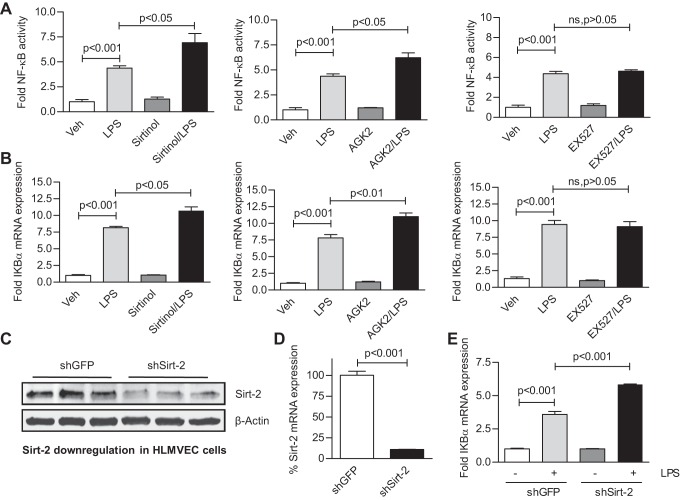Fig. 1.
Type 2 sirtuin (Sirt-2) suppresses NF-κB transcriptional activation in human lung microvascular endothelial cells (HLMVEC). A: HLMVEC were cotransduced with adeno-green fluorescent protein (GFP) and adeno-NF-κB reporter luciferase viral particles. The cells were then treated with 10 EU/ml LPS for 4 h in the absence or presence of the Sirt-1-specific inhibitor (10 μM EX527) or of either one of the Sirt-2 selective inhibitors (50 μM Sirtinol or 10 μM AGK2) (16 h pretreatment). Luciferase activity was determined in triplicate in equal volumes of cell lysates using a luminometer, normalized to the respective GFP fluorescence, and plotted as fold change from untreated controls (± SE, n = 3). B: HLMVEC were treated with 1 EU/ml LPS for 4 h in the absence or presence of sirtuin inhibitors as in A. Total RNA was extracted and reverse transcribed as discussed in materials and methods. The bar graph (± SE, n = 3) represents fold change in IKBα mRNA expression from control. HLMVEC were transduced with either GFP control or Sirt-2 shRNA lentiviral particles, as discussed in materials and methods. C and D: the shRNA lentivirus-mediated downregulation of Sirt-2 protein and Sirt-2 mRNA expression by Western blotting and TaqMan quantitative (q)RT-PCR, respectively. In E, 1 EU/ml LPS significantly induced more IKBα mRNA expression compared with control in wild-type cells and the downregulation of Sirt-2 significantly potentiated IKBα mRNA induction by LPS compared with LPS-treated wild-type cells (± SE, n = 3).

